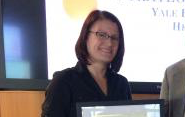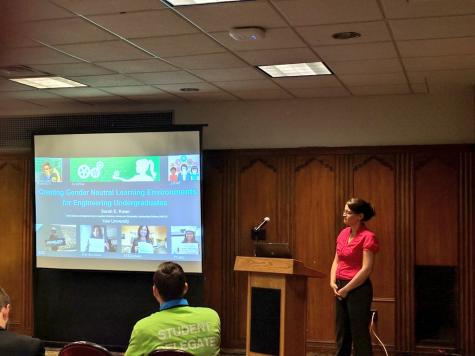Sarah Kwan Wins AEESP Presentation Award For Anti-Bias Project

Sarah Kwan, a Ph.D. candidate in the lab of Prof. Jordan Peccia gave a talk, “Creating Gender Neutral Learning Environments for Engineering Undergraduates,” in June, at Association of Environmental Engineering and Science Professors’ (AEESP) 2017 Conference on Advancing Healthy Communities through Environmental Engineering and Science, for which she was awarded Best Podium Presentation.
 |
| Photo Credit: Matthew Chan Ph.D., Post-Doctoral Associate - Virgina Tech |
The presentation was based on her project focused on “creating identity-safe academic environments that enhance student self-efficacy in undergraduate engineering women.” Kwan is working on the study through the Yale School for Engineering & Applied Science’s Advanced Graduate Leadership Program (AGLP) Fellowship.
Kwan started her education and career as a designer and worked for several years as an interior architect. But seeking a career that combined her passions for both the environment and working with vulnerable groups, she entered the field of environmental engineering. As she expected, she found issues of unconscious gender bias were far more common in the STEM field than in the design world, where there’s more gender balance, until you get to positions of power.
“Upon starting my graduate degree, I decided that I wanted to be part of a movement that called for change, with respect to gender bias, and more specifically implicit gender bias,” she said. “When I heard about the AGLP Fellowship, I knew this would be a great opportunity to embark on a study that could delve into challenges associated with this kind bias.”
In her initial research, she found plenty of research on the existence of gender bias in engineering and the STEM field as a whole, which showed these biases can lead to low self-efficacy – a person’s belief in their ability to succeed in a specific situation or task – in women, and ascribed low-self efficacy as one of the leading causes of women to drop out of engineering degrees and leave the engineering field as a whole. Kwan also noted that there was a lack of research on ways to reduce implicit gender bias – with an aim of increasing the self-efficacy of female engineers and thus increase their retention in the field.
“Implicit gender bias is not something we intend to have,” she says. “It is not a malicious sexism that men are carrying around like a shield to keep women out of engineering, it is something we have grown up with, something that is a societal norm, that we are unaware, for the most part, and we all have it.” Kwan noted that research shows that men and women equally hold bias toward women in STEM fields.
“So, I applied for and received an AGLP fellowship, through Yale School of Engineering & Applied Science, to pursue a study focused on addressing unconscious gender bias in the STEM learning environment. The AGLP fellowship is a unique and competitive program at Yale University that provides time and resources for fellows to pursue impactful ideas that are outside the scope of traditional doctoral studies.”
The objective of Kwan’s ongoing work is to create identity safe academic environments that enhance student self-efficacy in undergraduate engineering women. This is being done by taking proactive measures to address the implicit biases we hold. “My work aims to show that by simply being more aware of the existence of unconscious gender bias, we can substantially reduce, if not eliminate it.” To do this, Kwan enlisted professors – who teach core engineering classes from across the engineering disciplines – from several U.S. universities and provided them with confidence level surveys for their class students. The surveys are taken at the beginning and end of the semester, enabling her to tabulate background confidence level shifts over the course of these classes.
“Traditionally, educators hope students will acquire key skills through classes that will help boost their self-efficacy in the field” said Kwan. However, her initial results are showing otherwise; while men gained confidence in key areas, such as writing, speaking, mathematical, problem solving, leadership, and interpreting skills, women are losing it.
These same professors will then implement specially designed interventions in their classes this coming fall semester. The Interventions will be designed to reduce implicit gender bias by creating learning environments in which all genders are treated with the same respect, attention, quality of teaching, and learning experience. They will consist of short tests that will demonstrate to all participating students that they have implicit gender bias (teaching better self-awareness) a short presentation stating facts, findings, and implications of unconscious gender bias in the learning environment, which she plans to give at Yale in the fall. And the implementation of safe feedback mechanisms for students to report cases of any bias they have experienced. Thus, fostering the creation of “identity safe learning environments that are more inclusive, positive, and socially affirming” in which students can increase their self-efficacy; reducing the number of females from leaving the engineering field. Kwan will also provide access to a website she is developing (www.sarah-e-kwan.com) that highlights cases of unconscious gender bias that she and others have experienced and provides a platform for people to “discuss and reflect on these encounters.” It also provides links to articles, pod casts, and other media on gender bias she has found.
Kwan says “retaining women in the field of engineering is of paramount importance. It is not simply a matter of equality but a fundamental need within the discipline because, among other things, engineering is a highly creative subject matter. To be effective in this field, as with any creative endeavor, you need an innovative and diverse team. Secondly, our engineering workforce must be diverse if we want to meet global needs and maintain global competitiveness.”

